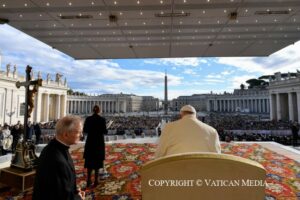This morning’s General Audience took place at 9:00 a.m. in St. Peter’s Square.
In his address in Italian, the Pope, continuing the cycle of catechesis The Passion for evangelisation: the apostolic zeal of the Believer, focused his meditation on the theme “The proclamation is for all” (Reading: Mt 28:18-20).
After summarising His catechesis in the different languages, the Holy Father addressed special expressions of greeting to the faithful present.
The General Audience concluded with the recitation of the Pater Noster and the Apostolic Blessing.
Catechesis. The passion for evangelization: the apostolic zeal of the believer. 27. Proclamation is for everyone
Dear brothers and sisters,
After having seen, last time, that the Christian proclamation is joy, today let us focus on a second aspect: it is for everyone, Christian proclamation is a joy for everyone. When we truly meet the Lord Jesus, the wonder of this encounter pervades our lives and demands to be taken beyond us. He desires this, that His Gospel is for everyone. Indeed, in it there is a “humanizing power”, a fulfilment of life that is destined for every man and woman, because Christ was born, died, and rose again for everyone. For everyone: no-one excluded.

In this sense, the Gospel reports Jesus’ surprising encounter with a foreign woman, a Canaanite, who begs him to cure her sick daughter (cf. Mt 15:21-28). Jesus refuses, saying that he was sent only “to the lost sheep of the house of Israel” and that “it is not fair to take the children’s bread and throw it to the dogs” (vv. 24, 26). But the woman, with the insistence typical of the simple, replies that “even the dogs eat the crumbs that fall from their master’s table” (v. 27). Jesus is struck by this and says, “woman, great is your faith! Be it done for you as you desire” (v. 28). The encounter with this woman has something unique about it. Not only does someone make Jesus change his mind, and a woman, foreign and a pagan, but the Lord himself finds confirmation that his preaching should not be limited to the people to whom he belongs, but open to all.
The Bible shows us that when God calls a person and makes a pact with some of them, the criterion is always this: elect someone to reach others, this is the criterion of God, of God’s calling. All the Lord’s friends have experienced the beauty, but also the responsibility and the burden of being “chosen” by him. And everyone has felt discouragement in the face of their own weaknesses or the loss of their certainties. But perhaps the greatest temptation is that of considering the calling received as a privilege: please, no, the calling is not a privilege, ever. We cannot say that we are privileged compared to others – no. The calling is for a service. And God chooses one in order to love everyone, to reach everyone.
It is also to prevent the temptation of identifying Christianity with a culture, with an ethnicity, with a system. In this way, though, it loses its truly Catholic nature, or rather for everyone, universal: it is not a little group of first-class, chosen people. Let us not forget: God chooses some to love all. This horizon of universality. The Gospel is not only for me, it is for everyone; let us not forget this. Thank you.
_________________________________________

I extend a warm welcome to the English-speaking pilgrims and visitors, especially the groups from England, Finland, the Netherlands, Malaysia, the Philippines, Korea and the United States of America. Upon all of you, I invoke the joy and peace of our Lord Jesus Christ. God bless you!
____________________________
Summary of the Holy Father’s words
Dear brothers and sisters!
In our continuing catechesis on apostolic zeal, we are reflecting on the Apostolic Exhortation Evangelii Gaudium and its summons to proclaim “the joy of the Gospel”. That joy is meant for everyone, since the risen Lord wishes to call all men and women to share in the fullness of life. In fidelity to the mission we received in baptism, we have a duty to share the Gospel with all whom we meet, not excluding anyone, because Christ was born, died, and rose again for all. The Scriptures reveal that when God calls individuals to discipleship, he also sends them forth as witnesses of his redeeming love. The Church herself is “catholic”, universal, for she has been entrusted with the mission of making disciples of all nations, while also fostering unity that respects and reconciles the rich variety of histories and cultures. May we who have experienced the beauty and joy of the Gospel become ever more conscious that its message is good news for all, and strive to show the face of a Church that is welcoming and embraces all.










